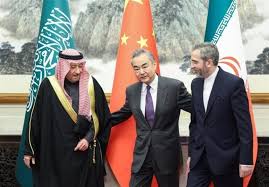Chinese Embassy, PREF organise High-Level Private Sector Investment Dialogue

Lahore: The newly formed Pakistan Regional Economic Forum (PREF), in collaboration with the Chinese Embassy, organized a High-Level Private Sector Investment Dialogue in Lahore.
The event was co-chaired by Chinese Ambassador Jiang Yikong and brought together key business leaders from Pakistan. Finance Minister Muhammad Aurangzeb addressed the gathering virtually from New York via a Zoom link.
In his opening remarks, Haroon Sharif, Chairman of PREF and former Chairman of the Board of Investment (BOI), highlighted the rapid economic transformation in the region and the vast opportunities that Pakistan presents for economic development. He stressed the importance of transitioning Pakistan from a debt-reliant economy to an investment-driven one by leveraging infrastructure connectivity. He outlined PREF’s goal of attracting private sector capital from Central Asia, the Gulf, and beyond to accelerate the implementation of the China-Pakistan Economic Corridor (CPEC) Phase II. Khalid Mansoor, former Special Assistant to the Prime Minister on CPEC, presented potential projects in key sectors identified by PREF, including climate-smart agriculture, energy transition, value-added textiles, emerging technologies, information technology, and trade logistics.
The Chinese Ambassador, in his address, underscored the importance of strengthening confidence in Pakistan’s development potential and the enduring China-Pakistan relationship.
He emphasized the need for both nations to take control of their own developmental futures, advocating for deepening and expanding China-Pakistan cooperation.
Ambassador Jiang also suggested using the agricultural strengths of neighboring provinces as a model for China-Pakistan agricultural collaboration. He called for Pakistan to offer more mutually beneficial policies to attract Chinese and regional entrepreneurs.
On the issue of Pakistan’s energy sector challenges, Ambassador Jiang clarified that these were not caused by Chinese enterprises or CPEC projects but were due to Pakistan’s long-standing structural issues in the energy sector. He noted that while Pakistan’s power generation capacity had improved, the sector is currently in a transition phase toward greater efficiency and price stability.
Finance Minister Aurangzeb fully endorsed PREF’s approach of promoting private sector-led regional projects, expressing the government’s commitment to facilitating financing through both multilateral and local resources. He mentioned that work had already begun on a USD 1 billion fund for regional joint ventures, initiated by Pak-China and Saudi-Pak investment companies. The minister also reaffirmed his determination to collaborate with China and other regional partners for the swift implementation of CPEC-II, contributing to the overall prosperity and stability of the region.
The session concluded with an interactive dialogue, where participants exchanged ideas, suggestions, and potential joint venture projects, aimed at capitalizing on each country’s comparative advantages.





